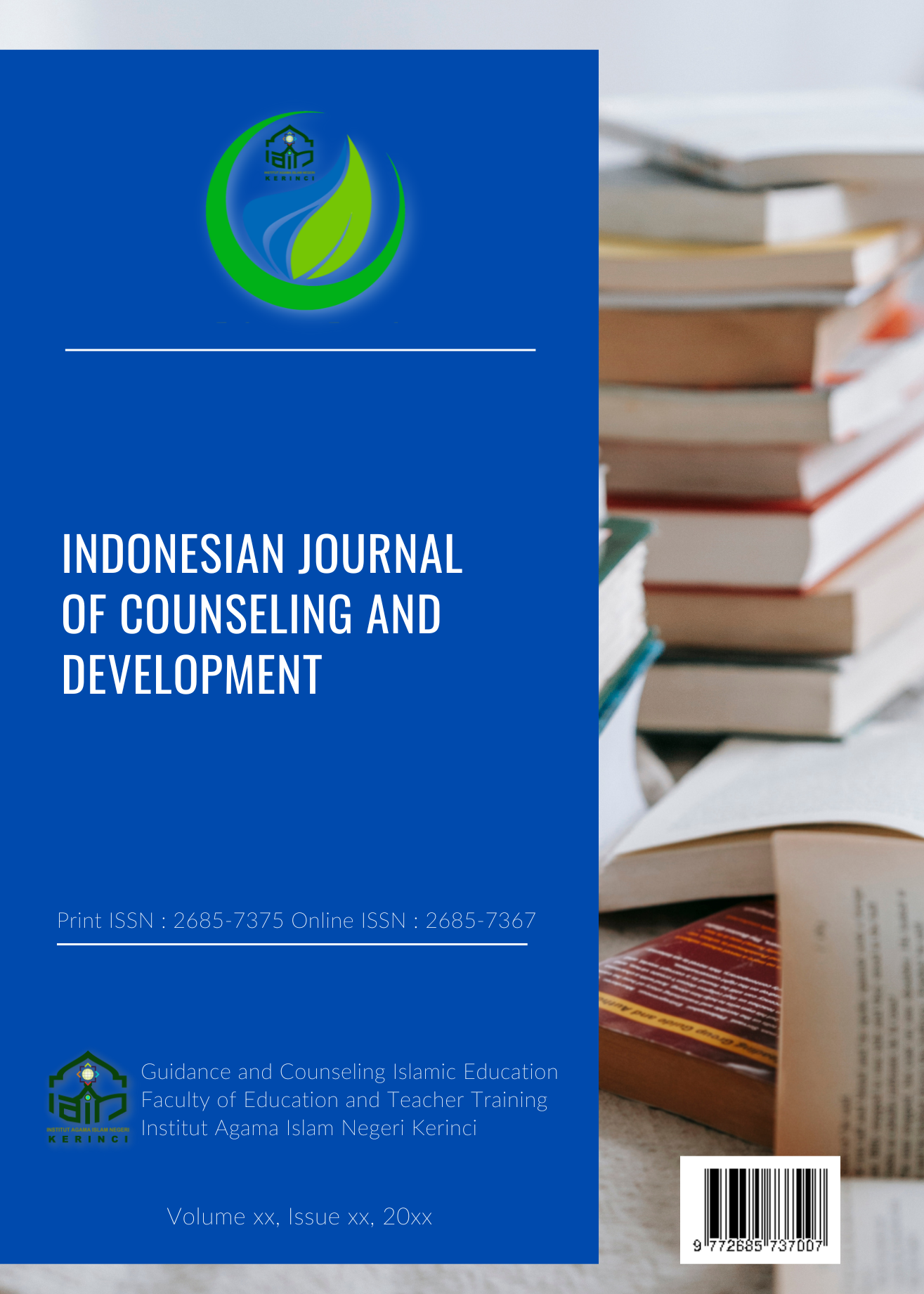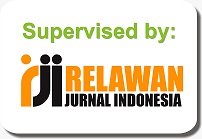Spiritual Counseling Grounded in Buya Hamka’s Tazkiyatun an-Nafs: Relevance and Implementation in the Context of Psychological Issues
Abstract
The escalating prevalence of psychological issues in modern society underscores the need for counseling approaches that transcend purely rational and behavioral strategies to encompass the spiritual dimension of human experience. This article aims to conceptualize a foundational model of spiritual counseling rooted in Buya Hamka's Tazkiyatun an-Nafs framework, presenting an integrative alternative deeply embedded in local values. Employing a qualitative-conceptual approach, this study proposes a three-phase counseling structure: pre-counseling, core process, and post-counseling. This model integrates the principles of Takhalli (purifying the heart from negative influences), Tahalli (adorning the heart with positive values), and Tajalli (guiding individuals to rediscover deeper meaning and purpose in life). The model emphasizes counseling as a process of spiritual recovery aimed at alleviating psychological problems, facilitated through personalized, reflective, and transformative guidance. While conceptual, this article significantly contributes to the contextualization of Islamic counseling and lays the groundwork for future empirical research.
Downloads
References
Bartz, J. D. (2009). Theistic Existential Psychotherapy. Psychology of Religion and Spirituality, 1(2), 69–80. https://doi.org/10.1037/a0014895
Fadli, R. P., Putri, Y. E., Amalianita, B., Zola, N., & Ifdil, I. (2020). Treatment for anxiety using spiritual emotional freedom technique. J Couns Educ Technol, 3(1), 41–46.
Faiz, A., Yandri, H., Kadafi, A., Mulyani, R. R., Nofrita, N., & Juliawati, D. (2019). Pendekatan Tazkiyatun An-Nafs untuk membantu mengurangi emosi negatif klien. Counsellia: Jurnal Bimbingan Dan Konseling, 9(1), 65. https://doi.org/10.25273/counsellia.v9i1.4300
Hamka. (1960). Tasawuf Modern. Djajabakti.
Haque, A., Khan, F., Keshavarzi, H., & Rothman, A. E. (2016). Integrating Islamic traditions in modern psychology: Research trends in last ten years. Journal of Muslim Mental Health, 10(1), 75–100. https://doi.org/10.3998/jmmh.10381607.0010.107
Hawwa, S. (2005). Tazkiyatun Nafs: Intisari Ihya Ulumuddin. Pena Pundi Aksara.
Istiqomah, I., Mujtaba, M. S., & Anwarudin, A. (2024). Model Terapi Psikospiritual: Implementasi Konsep Tazkiyatun Nafs Hamka Dalam Mengatasi Penyakit Jiwa. Risalah, Jurnal Pendidikan Dan Studi Islam, 10(1), 397–408. https://doi.org/10.31943/jurnal_risalah.v10i1.790
Kementerian Kesehatan RI. (2018). Laporan Nasional Riskesdas 2018. https://repository.badankebijakan.kemkes.go.id/id/eprint/3514/
Keskinoğlu, M. Ş., & Ekşi, H. (2019). Islamic spiritual counseling techniques. Spiritual Psychology and Counseling, 4(3), 333–350. https://dergipark.org.tr/en/pub/spiritualpc/issue/52546/693016
Koburtay, T., Jamali, D., & Aljafari, A. (2023). Religion, spirituality, and well-being: A systematic literature review and futuristic agenda. Business Ethics, the Environment & Responsibility, 32(1), 341–357. https://doi.org/10.1111/beer.12478
Koenig, H. G. (2012). Religion, spirituality, and health: The research and clinical implications. International Scholarly Research Notices, 2012(1), 278730. https://doi.org/10.5402/2012/278730
Mursalin, M. (2024). Pendekatan Tasawuf Dan Psikoterapi Perspektif Islam. CONS-IEDU, 4(1), 77–90. https://doi.org/10.51192/cons.v4i1.813
Nasution, B. A., & Siregar, H. R. (2007). Akhlak Tasawuf. Raja Grafindo Persada.
Pandu, R. (2022). Konsep Tasawuf Perspektif Buya Hamka dan Relevansinya dengan Tujuan Pendidikan Islam [UIN Raden Intan Lampung]. https://repository.radenintan.ac.id/id/eprint/18895
Pargament, K. I. (2001). The psychology of religion and coping: Theory, research, practice. Guilford press.
Pargament, K. I. (2011). Spiritually integrated psychotherapy: Understanding and addressing the sacred. Guilford press.
Powers, R. (2005). Counseling and spirituality: A historical review. Counseling and Values, 49(3), 217–225. https://doi.org/10.1002/j.2161-007X.2005.tb01024.x
Prayitno, & Amti, E. (2004). Dasar-dasar Bimbingan dan Konseling. Rineka Cipta.
Rafiola, R. H., Alfaiz, A., Yuzarion, Y., Yandri, H., Awlawi, A. H., & Saputra, R. (2023). Modifikasi Perilaku Psikosintesis vs Spiritual perspective : Indonesian Journal of Counseling and Development, 5(2), 108–119. https://doi.org/10.32939/ijcd.v5i2.3115
Richards, P. S., & Bergin, A. E. (2004). Casebook for a spiritual strategy in counseling and psychotherapy. American Psychological Association Washington, DC.
Richards, P. S., Pargament, K. I., Exline, J. J., & Allen, G. E. K. (2023). Introduction: Bringing spiritually integrated psychotherapies into the health care mainstream. In P. S. Richards, G. E. K. Allen, & D. K. Judd (Eds.), Handbook of spiritually integrated psychotherapies (pp. 3–29). American Psychological Association. https://doi.org/10.1037/0000338-001
Rizka, R. S., Putri, R. Y., Alfarezi, R. A., & Saputra, R. W. D. (2023). Tazkiyatun Nafs Terminology: Buya Hamka’s View. Journal of Research in Islamic Education, 5(2), 118–127.
Roza, N. J. (2022). Reduce the Anxiety of the Elderly Through Individual Counseling the Tazkiyatun Nafs Approach. Marawa, 1(1), 15–21.
Sholahuddin, A. (2021). Konsep Tazkiyatun Nafs Menurut Hamka dalam Tafsir Al-Azhar dan Relevansinya Terhadap Realitas Sosial. UIN Sunan Kalijaga Yogyakarta.
Subroto, A. N., Wulandari, R., & Suharni, S. (2017). Pendekatan Konseling Spiritual Sebagai Alternatif Pencegahan Perilaku Bullying (Kekerasan). Prosiding Seminar Nasional Bimbingan Dan Konseling, 1(1), 104–109.
Suhartiwi, S., Afdal, A., Yusuf, A. M., Iswari, M., Mudjiran, M., & Ifdil, I. (2024). Empowering Students: Examining the Effectiveness of Taʻlīm Mutaʻallim Group Guidance. Islamic Guidance and Counseling Journal, 7(1).
Vaughan, F. (2002). What is Spiritual Intelligence? Journal of Humanistic Psychology, 42(2), 16–33. https://doi.org/10.1177/0022167802422003
World Health Organization. (2022). World mental health report: Transforming mental health for all. https://www.who.int/publications/i/item/9789240049338
Worthington, E. L., & Aten, J. D. (2009). Psychotherapy with religious and spiritual clients: An introduction. Journal of Clinical Psychology, 65(2), 123–130. https://doi.org/10.1002/jclp.20561
Yandri, H., & Juliawati, D. (2024). The Role of Counselors in Spiritual Counseling to Reduce Bullying Trauma among Students in Islamic Higher Education Institutions. Indonesian Journal of Counseling and Development, 6(2), 111–120. https://doi.org/10.32939/ijcd.v6i2.5095
Yandri, H., Kholidin, F. I., Sujadi, E., & Juliawati, D. (2024). Finding Inner Peace : An Exploration of Forgiveness Therapy for Bullying Trauma Recovery. Al-Musyrif: Jurnal Bimbingan Dan Konseling Islam, 7(1), 24–38. https://doi.org/10.38073/almusyrif.v7i1.1539
Yandri, H., Marsidin, S., & Karneli, Y. (2022). The impact of tazkiyatun an-nafs counseling in reducing the trauma of violence experienced by a wife. Jurnal Bimbingan Dan Konseling Ar-Rahman, 8(2), 179–184. https://doi.org/10.31602/jbkr.v8i2.9068
Zahir, F. R., & Qoronfleh, M. W. (2025). Traditional Islamic spiritual meditative practices: powerful psychotherapies for mental wellbeing. Frontiers in Psychology, Volume 16. https://doi.org/10.3389/fpsyg.2025.1538865
Zatrahadi, M. F., Suhaili, N., Ifdil, I., Marjohan, M., & Afdal, A. (2022). Urgensi Pengembangan Konseling Spiritual bagi Pecandu Narkoba untuk Mereduksi Thanatophobia. Jurnal Riset Tindakan Indonesia, 7(1), 15–23.
Copyright (c) 2025 Hengki Yandri, Dosi Juliawati

This work is licensed under a Creative Commons Attribution 4.0 International License.








